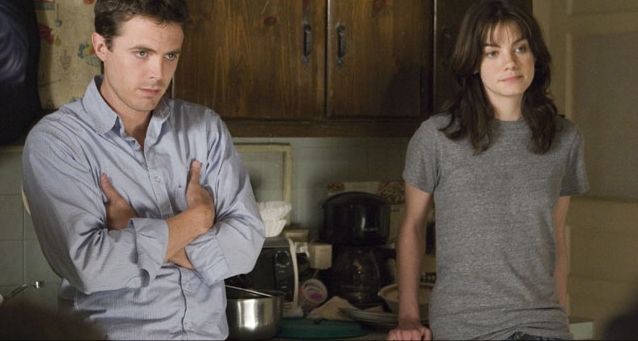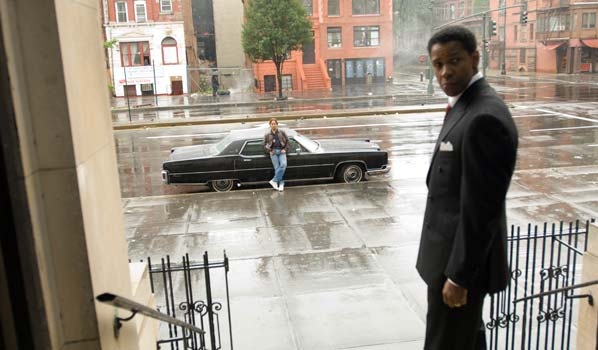“We may in fact have finally found that bridge to the 21st century that Bill Clinton told us about. Its name is Obama.” In the pages of The Atlantic Monthly, conservative Andrew Sullivan makes his case for Barack Obama: “Obama’s candidacy in this sense is a potentially transformational one. Unlike any of the other candidates, he could take America — finally — past the debilitating, self-perpetuating family quarrel of the Baby Boom generation that has long engulfed all of us…If you are an American who yearns to finally get beyond the symbolic battles of the Boomer generation and face today’s actual problems, Obama may be your man.” Of Clinton, Sullivan writes, “[s]he has internalized what most Democrats of her generation have internalized: They suspect that the majority is not with them, and so some quotient of discretion, fear, or plain deception is required if they are to advance their objectives. And so the less-adept ones seem deceptive, and the more-practiced ones, like Clinton, exhibit the plastic-ness and inauthenticity that still plague her candidacy. She’s hiding her true feelings. We know it, she knows we know it, and there is no way out of it.” Update: Apparently, Obama reads The Atlantic.
Month: November 2007
Little Girl Lost.

Wading into the same dark, turbid, and clannish Boston waters as Mystic River (also by author and Wire contributor Dennis Lehane) Ben Affleck’s Gone Baby Gone is another wicked-smaht tale of horrible crimes and neighborhood secrets in and around the Hub, and marks a promising debut for Affleck as a director (and another step for brother Casey, after The Assassination of Jesse James by the Coward Robert Ford, towards leading-man status.) The last act unfolds a mite too slowly, I thought, but for the most part Gone Baby Gone — for its ruminations on the meaning (and inescapability) of place as much as its attention to Beantown detail — is an intelligent and gripping crime story that’s worth catching. Affleck, Lehane, and co. are confident enough here to ask tough questions without definitive answers, and it’s those uneasy ambiguities in Gone Baby Gone, as much as the local color, that ultimately sticks with you.
As another day dawns in Dorchester (one of what could be almost any of the white working-class neighborhoods surrounding Boston), Amanda McCready, age 4, is still missing, 72 hours after disappearing from her mother’s unlocked second-floor apartment, and where she is now we can only guess. By this point, the press are having a field day with the abduction story, the police are starting to have doubts about the girl’s survival, and Amanda’s Aunt Bea (Amy Madigan) and Uncle Lionel (Titus Welliver, of Deadwood) are looking to bring flesh blood to the search, namely private investigators Patrick Kenzie (Affleck) and Angie Gennaro (Michelle Monaghan). Kenzie and Gennaro have doubts about taking the case — neither particularly wants to turn up a dead girl — but, as lifelong locals, they know they can find people and go places the badges can’t. In the manner of films immemorial, the police officer in charge of the case (Morgan Freeman) doesn’t take too kindly to these P.I. interlopers on his heels, but assigns them two ornery cop liaisons (Ed Harris and John Ashton) regardless. And, once Kenzie and Gennaro have re-interviewed Amanda’s troubled, hard-partying mom, Helene McCready (The Wire‘s Amy Ryan, giving a Best Supporting Actress-worthy performance) and checked out some of her sketchier haunts, they — sure enough — turn up some new leads in the hunt. But the trail’s growing colder by the minute, and as both P.I.’s know, few child abduction stories ever result in a happy ending — why would Amanda’s be any different?
Dennis Lehane, Amy Ryan, Michael Williams (a.k.a. Omar) appears briefly here as a cop…if I keep making connections here to The Wire, it only speaks in Gone Baby Gone‘s favor. As with that show and Bal’more, this movie relishes its urban environment — this is a Boston story through and through, and that strong sense of place brings the film to life more than anything else. Also like The Wire, Affleck’s film doesn’t refrain from acknowledging that the world is often not a storybook place. (The second act of the movie is particularly dark, and while I thought Affleck perhaps overrelied on aerial establishing shots of Boston and images of “regular” people at times throughout, his delicate handling of this potentially explosive section of the film in particular suggests his potential as a director.)
True, much of what is excellent about Gone Baby Gone must be attributed to Lehane’s book. But, there have been a lot of lousy movies made about excellent books over the years, and if nothing else, Affleck (and his co-screenwriter Aaron Stockhard) have brought Lehane’s story to the screen without sacrificing any moral complexity or narrative momentum. As I said, I think the film lags slightly in the third act (and I do have some issues with Monaghan’s character arc by the end, which I can’t really discuss without giving the film away), but the quietly haunting coda at the end redeemed a lot of those issues for me. The occasional shocks and disruptions notwithstanding, it seems, people are what they are, and life goes on as ever in the old neighborhood.

Freedom Fails.
“‘Although I lost by the slimmest margin in presidential election history — only 10 votes — I have chosen not to put the country through another agonizing Supreme Court battle,’ Colbert said Monday in a statement. ‘It is time for this nation to heal.’” In a grievous blow to the future of our country, Stephen Colbert drops out of the presidential race after being blocked out of the SC Democratic primary. “‘I want to say to my supporters, this is not over,’ Colbert said. ‘While I may accept the decision of the Council, the fight goes on! The dream endures!…And I am going off the air until I can talk about this without weeping.’”
Pakistan on the Ropes.
“‘The train is derailed and off the tracks,’ said Stephen P. Cohen, author of ‘The Idea of Pakistan.‘ ‘We have to give ourselves a share of the responsibility for this. We placed all of our chips on Musharraf.’ At this point, Cohen added: ‘I don’t think there is anything we can do. We are not big players in this anymore.’” Dubya diplomacy takes another huge hit as a power-hungry President Musharraf declares martial law in Pakistan to ensure his continued reign, sparking nationwide protests and leaving the Bushies between a rock and a hard place. “One adviser traveling with Rice saw a silver lining in the rapid turn of events. ‘Thank heavens for small favors,’ the official said. Compared to Pakistan, ‘Iraq looks pretty good.’” Oh, joy.
Update: Slate‘s Fred Kaplan weighs in. “The state of emergency in Pakistan signals yet another low point in President George W. Bush’s foreign policy — a stark demonstration of his paltry influence and his bankrupt principles. More than that, the crackdown locks us in a crisis — a potentially dangerous dynamic — from which there appears to be no escape route…The Bush foreign policy was neither shrewd enough to play self-interested power politics nor truly principled enough to enforce its ideals.“
Post-Bush, it’s a toss-up.
There’ s no mandate for Rudy or Romney just yet…In keeping with the strong support for none of the above discovered earlier this year, a new poll finds the Republican nomination is more up for grabs than it’s been in almost thirty years. “Not since 1979 has the leading Republican candidate had less than 40 percent support in national polls in the November heading into an election year.“
The Haint of Harlem.

Superfly, Serpico, The French Connection…Ridley Scott’s American Gangster plays for most of its run like a greatest hits cover-medley of the cop and gangster thrillers of the 1970s. But, while well-made and eminently watchable, Gangster never becomes truly engaging. (EW’s Owen Gleiberman pretty much nailed it when he called the film “a ghost version of a 70’s classic.”) It’s hard to fault the superior production values or the large, impressive cast, which is chock-full of ringers in even the smallest of roles. But for all the quality on display, American Gangster doesn’t come close to matching the mischievous vibrancy of Denzel Washington’s last 70’s homage, Spike Lee’s Inside Man, nor is it even the best attempt at a throwback 70’s cop flick this year — that would be David Fincher’s haunting Zodiac. Gangster hits its beats well enough, which isn’t surprising given that Ridley Scott’s at the helm. But, however gritty and lived-in at times, it’s still missing the pulse that would make it a truly memorable movie. Frank Lucas may be an O.G., but Gangster, frankly, could’ve benefited from more in the way of originality.
As Gangster opens, we witness the aforementioned Frank Lucas (Washington) lighting a bound man on fire and then unloading a clip into him — from the get-go, this guy clearly has a dark side. We then watch him watching his mentor, “Bumpy” Johnson (Clarence Williams III) doling out Thanksgiving turkeys to the people of Harlem from the back of a truck, driving home, a la Willie Stark in All the King’s Men, the importance of public perception in maintaining a criminal empire. Bumpy lives just long enough in the film to impart some choice lessons in vertical integration before he succumbs to a heart attack, leaving Lucas to take over and consolidate the Harlem drug trade. This Lucas does by bypassing all the usual middlemen — the Italian mafia, crooked cops, etc. — and procuring his heroin supply direct from the source, deep in the jungles of Southeast Asia, thus enabling him to sell purer stuff on the streets at a cheaper price. (The product gets into the country by way of U.S. military planes coming back from Vietnam.)
As this new drug empire grows — and stays mostly under the radar, thanks to Lucas’ emphasis on ignoring flash — we also follow the story of one Richie Roberts (Russell Crowe). As cops go, Roberts is old-school: He prides himself on his honesty and incorruptability despite his intimate connections with some mid-level mafiosi, his flagrant sleeping around (which has turned his failed marriage to Carla Gugino into an ugly custody battle) and the fact that every other po-lice in his unit — and in NYC, for that matter — seems to be on the take. Eventually, of course, Det. Roberts sets his sights on Lucas, and the game truly begins…
But, game or no, everybody knows the dice are loaded. Part of the problem with American Gangster is that there’s no real mystery about how it’ll all turn out in the end. Even if you don’t know a thing about Lucas going in (and I didn’t), these sorts of movies invariably follow a rather predictable pattern, and all the police procedural work, Harlem vignettes, or heroin house of horror asides throughout here can’t hide the fact that Gangster follows it to the letter. Also, while Washington and Crowe are both among some of the best actors working today, neither is given much to work with here. As a hard-working, quick-witted family man who prizes loyalty and doesn’t take any guff from those around him, the Frank Lucas character is right in Denzel’s usual wheelhouse, even despite the additional sociopathic streak. (His turn in Training Day seemed more of a stretch.) And Crowe’s Roberts is well-played but, frankly, not all that interesting as written. Crowe can definitely do conflicted cops — Exhibit A, L.A. Confidential — but this is the first performance by him that I can remember that doesn’t make much of an impression.
And that doesn’t just go for the top two. American Gangster boasts a veritable Murderer’s Row of quality, likable character actors in its credits — not only Williams and Gugino but Chiwetel Ejiofor, Idris Elba, Josh Brolin, Joe Morton, Jon Polito, John Hawkes, John Ortiz, Ruby Dee, and rappers RZA and Common (as well as Cuba Gooding Jr. and Norman Reedus) — but more often than not they just get lost in the shuffle here. (That being said, Armand Assante, overplaying his genteel mafia don to the hilt, does manage to squeeze in a particularly lousy performance.) Not to be too harsh, Gangster isn’t a terrible film, nor even really a bad one. But, however well-made, it’s more by-the-numbers than it is blue magic.

Blood and Iron.
“I can’t keep doing this on my own…with these people.” Making it online of late, a new domestic trailer for Paul Thomas Anderson’s There Will Be Blood, and a new international teaser for Jon Favreau’s Iron Man. (The original clips are here and here.)
Diplomats in Arms.
“Service in Iraq is ‘a potential death sentence,’ said one man who identified himself as a 46-year Foreign Service veteran. ‘Any other embassy in the world would be closed by now,’ he said to sustained applause.” Want to join the Foreign Service? Here’s your chance…US diplomats appear to be on the verge of mutiny over forced postings in Baghdad. “Foreign Service officers swear an oath to serve wherever the secretary of state sends them, but no directed assignments have been ordered since the late 1960s, during the Vietnam War…A poll conducted this month by the American Foreign Service Association found that only 12 percent of officers ‘believe that [Secretary of State Condoleeza] Rice is fighting for them’.”
Waterboarding? Is that in the X-Games?
“Will we join that gloomy historical line leading from the Inquisition, through the prisons of tyrant regimes, through gulags and dark cells, and through Saddam Hussein’s torture chambers? Will that be the path we choose?” As a result of his continued inability to define waterboarding as torture, Michael Mukasey’s chances of becoming AG grow murkier. “‘If we are going to restore the image of the United States of America, the highest law enforcement officer should be clear, firm, unequivocal: that waterboarding and torture are unacceptable, un-American, illegal and unconstitutional,’ Durbin said.” Update: But, of course, key Dems capitulate, namely Senators Schumer and Feinstein. Good God, our party is pathetic at times.
Ballad of Casino Jack, Refrain?
“The White House has said that Jack Abramoff had very little contact with the President’s staff and that it wanted all the relevant facts to be public. The 600 pages of documents it is withholding are directly relevant and should be produced.” Remember Casino Jack? Henry Waxman does, and has asked the White House to produce 600 pages of information previously withheld from the House investigation into Abramoff’s activities. (And this time, the White House might actualy play ball. Given an out by Waxman — that the information might be shown only to committee staff rather than going public — White House Counsel Fred Fielding pounced, “saying he was ‘pleased that such a concept is proposed in your letter’ and pledging to ‘seek to accommodate our respective interests in the documents we have withheld.’“)

